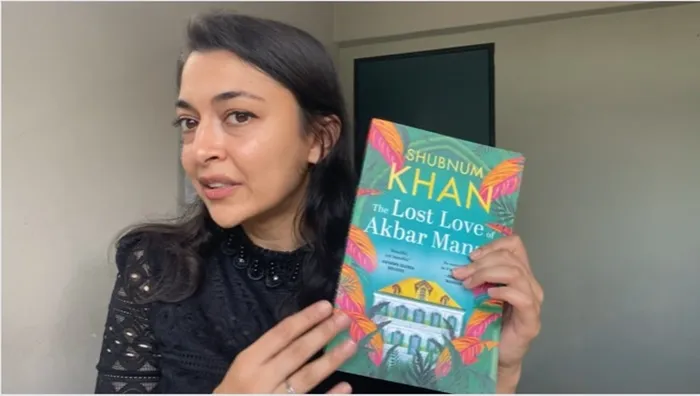Spooky Durban story gets traction abroad

Author Shubnum Khan with the South African version of her book The Lost Love of Akbar Manzil.
It took Durban author Shubnum Khan eight years to write The Lost Love of Akbar Manzil because she let the eccentric mix of characters lead the story.
“I just wrote the strong characters and put them in the house and then I’m like ‘you lead me where you want to lead me, you open which doors you want to open’.”
The result was a book with a love story at its core but which also has elements of horror and magic realism and has been widely well-received since its release in January.
“I always wanted to write a kind of love story but I realised, you can’t tell a love story without telling a life story. I was going to have a young person talking to an older person in a block of flats but that idea kept growing and growing to encompass all the things that I love, which are horror, tragedy, mystery and magic realism.”
The Lost Love of Akbar Manzil is Shubnum’s third book and second novel. Her first novel, Onion Tears, was published in 2011 and was shortlisted for the Penguin Prize for African Writing.
“I didn’t write for a long time. Then in 2021 I wrote a travel memoir called How I Accidentally Became a Global Stock Photo. That was my first non-fiction book and then this year, I published this book The Lost Love of Akbar Manzil, which is my second novel and that took about eight years to write, so I took a big break between my novels.”
In between Shubnum also lectured in media studies at the University of KwaZulu-Natal and freelanced as an artist, journalist and copywriter before picking up her novelist’s pen again. This time around, she found the writing experience vastly different.
“Onion Tears was for my master’s in creative writing at the University of KwaZulu-Natal,” she said. “For my first novel I had a mentor. Kobus Moolman, who was a poet at the University of the Western Cape, was my supervisor and he was pushing me and so it was a different experience. Writing The Lost Love of Akbar Manzil was basically just me, on my own, floundering in the ocean, trying to figure it out how to make this story work.”
The novel tells the story of a sweet romance between Meena Begum and Akbar Ali Khan, who marry despite their differences in class and religion, and the hatred of Akbar’s family. The love and betrayal which afflict the couple in the 1920s, take place in a sentient mansion, the titular Akbar Manzil, on the Durban coastline. The story plays out along two timelines with a cast of kooky characters.
“I went out of my way to write very strange characters, like I’ve never met anyone who speaks in the third person and Pinky speaks in the third person all the time,” Shubnum said, referring to the oddball maid who lives in the pantry and is obsessed with Bollywood.
Shubnum says her favourite characters to write were Sana, a curious 16-year-old girl, who explores the house and unlocks the long-hidden mysteries of the past, and Zuleikha, an elderly, flamboyant music teacher.
“I like Sana because she reminds me of a young girl waiting for the world, and you don’t know what to expect from the future, and I like Zuleikha because she doesn’t give a damn about anyone and she’s just herself and that’s a very rare thing to see in a woman.”
There are also a few ghosts, though you may not guess this from the colourful South African version of the cover. Internationally, however, the clue is in the title. The UK and US versions have been released as the The Djinn Waits a Hundred Years.
“You know immediately there is going to be a ghost,” Shubnum says of the international version. “I think maybe in South Africa it’s a bit harder to tell that there are going to be ghosts in it.”
Internationally the book has also been billed as a horror.
“It’s not a horror,” Shubnum said. “But it does have elements of horror in it.”
Despite the books’ eccentricities, the characters may resonate with South African readers because Shubnum says they are amalgamations of people she’s met and characters she has read.
“I come from a family of Indian women so I know what it is like to have aunties talking all the time, and fighting, and making low comments to each other but I can’t say I based anything on anyone I know. They certainly must be an amalgamation of characters that I’ve read, of people that I have met on the street, especially in Durban. Like, if you are buying vegetables and are at a shop and you hear people talking about their aches and pains, their bodily problems. They are interesting characters.”
The novel is also getting good traction overseas, and this has surprised Shubnum.
“I didn’t think the US would be interested in a community story about Indian people living in South Africa but the New York Times wrote a really good review about the novel. But in South Africa too, people have been enjoying it. I’ve been getting good feedback. I can see from reader reviews, not critical reviews, that it is either a book you hate or you love and I like that. I want it to be that kind of book."
Related Topics: